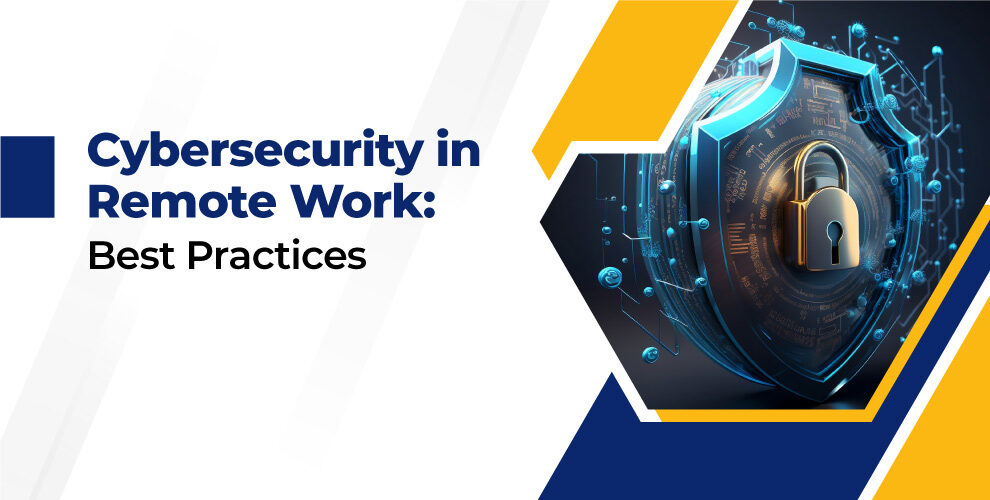Organizations of all sizes face cyber-attacks more frequently than ever before. The COVID-19 outbreak in 2020 made IT professionals worldwide work from their residences, making remote work a necessity for most modern businesses to attract talent and ensure seamless business operations.
Remote work environments have unique challenges concerning data security since they do not offer the same level of security safeguards as office environments. Office premises are equipped with multiple layers of security protocols, making it hard for security breaches. However, with remote work, new risks emerge for the company, making additional security policies crucial.
With rising cyber crimes pursuing specialized programs in BE cyber security colleges in Tamil Nadu will enable you to meet industry requirements for competent cyber security professionals.
In this blog, we will delve into the complex challenges encountered with remote work environments and discuss effective strategies and policies to protect digital assets in this evolving modern business landscape.
1. Securing the Home Office: While working from remote environments, that is from home, your personal devices and networks at home may not have the same level of security as corporate environments. Employees must secure their home networks, keep their systems updated with the latest software, and use strong, unique passwords for work-related accounts.
2. Zero Trust Security Model: Embracing a Zero Trust security model is vital in remote work conditions, wherein you do not trust anyone by default, whether inside or outside the organization. You should regularly verify the authentication and authorization of individuals and provide access to resources and data on a need-to-know basis.
KAHE offers specialized courses in cyber security and is one of the best colleges for CSE in Coimbatore.
3. Multi-Factor Authentication (MFA): MFA is a key security component that goes beyond passwords to strengthen your security measures. Integrating multi-factor authentication to access corporate systems and applications helps prevent unauthorized access even when login credentials are compromised.
4. Secure Virtual Private Networks (VPNs): VPNs establish a secure pathway enabling you to securely transmit data over the internet. And it’s wise to ensure that employees use VPNs when accessing corporate resources from remote locations to encrypt data and protect it from interception.
With rising cyber-crimes pursuing specialized programs in BE cyber security colleges in Tamil Nadu will enable you to meet industry requirements for competent cyber security professionals.
5. Endpoint Security: It’s best practice to secure your endpoints, which include laptops, smartphones, and other devices, with robust endpoint security solutions. They provide real-time threat detection and response capabilities against malware and other threats.
6. Regular Software Updates: Cybercriminals take advantage of weaknesses in outdated software. Hence, it’s essential to keep your operating systems, applications, and cybersecurity tools updated to help you effectively identify and mitigate cyber-attacks.
KAHE offers specialized courses in cyber security and is one of the top 10 colleges in Coimbatore for Computer Science.
7. Employee Training and Awareness: Participating in cybersecurity training and developing awareness about common attack vectors like phishing emails serve as the initial line of defence against cyber threats. This preparedness can help you recognize and respond to threats effectively.
8. Secure File Sharing and Collaboration Tools: It’s best practice for organizations to embrace secure solutions integrating encryption, access controls, and audit trails to protect sensitive data, especially with the widespread use of collaboration tools and file-sharing platforms in remote work environments.
KAHE offers specialized courses in cyber security and is one of the best colleges for CSE in Coimbatore.
9. Data Backup and Recovery: It’s also vital to have a robust data backup and recovery plan. These approaches allow you to mitigate the impact of data breaches or ransomware threats.
10. Incident Response Plan: Ensure your organization has a well-defined incident response plan in place, which outlines the approach for quick and effective identification, response, and recovery from security incidents.
KAHE offers specialized courses in cyber security and is one of the top 10 colleges in Coimbatore for BSc Computer Science.
11. Continuous Monitoring and Threat Intelligence: The best practice to stay updated on the latest cybersecurity threats and vulnerabilities is to utilize threat intelligence feeds and continuously monitor your systems for any weaknesses. Being proactive in responding to cyber-attacks enables you to identify and mitigate potential risks.
The increase in remote work has significantly influenced business functions, leading to greater adaptability and productivity. However, this change has also intensified the need for robust cybersecurity measures. With employees and organizations handling sensitive data from different locations, safeguarding digital assets has become crucial.
With the increase in cyber threats, businesses need cyber security professionals to implement security protocols for remote work environments. Pursuing cyber security courses in information technology colleges in Coimbatore will enable you to embrace a comprehensive approach to protecting digital assets from cyber threats.


